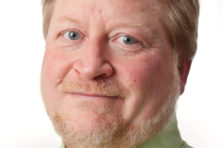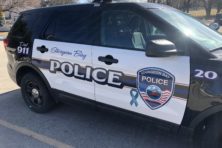The Language of Sexual Misconduct
- Share
- Tweet
- Pin
- Share
Editor’s Note: We asked Door County District Attorney Ray Pelrine to clarify the lexicon of sexual misconduct for this month’s Coordinated Community Response Column.
An item on the six o’clock news tells of a man sent to prison for 20 years for committing the crime of “First Degree Sexual Assault of a Child.” A television crime drama deals with the “Rape” of a young business executive. An article in a statewide newspaper describes a jury awarding millions of dollars to a woman who prevailed in a lawsuit against her employer for “Sexual Harassment.”
It is easy to see that all of these deal with matters of sexual misconduct, but what do they actually mean? How, if at all, are they alike and different? And why are there so many different ways and words used to describe behaving badly when it comes to sex? I will try to shed a bit of light on all of this.
First off, it must be pointed out that in order to understand the language of sexual misconduct, context is everything. Depending upon where you hear the word or phrase, its meaning may be radically different. I’ll try to explain by example.
As the District Attorney for Door County I enforce the criminal laws created by the Wisconsin Legislature within the confines of Door County, including sex crimes. Those crimes have specific names given to them by our legislature. As such they have a common meaning only in Wisconsin. That means once you go beyond our state’s borders the label I attach to a particular sexual offense may have little or no meaning in another state.
Television and movies may make things even murkier as, depending upon the quality of the writing, the name used to describe a particular sex crime may follow the law of the setting in which the drama takes place or may be wholly made up. If something is called “Rape” on CSI Las Vegas this may be because the State of Nevada has such a crime, or the writers of the show chose that label for the visceral impact carried by the word. Believe it or not, there is no such crime as “Rape” in Wisconsin. We do have crimes that match the general definition of the word “Rape” – the sexual assault of another person by force, threat of force, or use of a weapon – but in Wisconsin that is not called “Rape.”
So what are some of the names given to different sex crimes? In general, Wisconsin’s Criminal Code breaks down sex crimes into two broad categories: crimes committed against children and those committed against someone regardless of age. In addition to these two broad categories, a number of sex crimes have been created by the Legislature to deal with specific types of conduct or offenders.
Sex crimes involving children include First and Second Degree Sexual Assault of a Child. First degree is the most serious and involves conduct against very young children and/or extremely serious behavior such as the use of force, weapons, or the causing of injury. Second Degree Sexual Assault of a Child involves any type of sexual contact, including touching, with a child under age 16.
Sex crimes beyond those committed against a child follow the same naming classification in that they range in seriousness from First Degree through Fourth Degree. As with children, the most serious types of sexual assault, classified as First Degree, involve egregious conduct, use of weapons, threats, or the causing of injury.
Second Degree Sexual Assault may involve such conduct but also includes having sex with a person who suffers from mental illness or deficiency, is under the influence of some intoxicant, or is unconscious. Third Degree Sexual Assault involves sexual intercourse with another without that person’s consent. Probably the least serious type of sex crime in Wisconsin is Fourth Degree Sexual Assault, which involves any type of sexual touching of another without that person’s consent.
In addition to the general distinction between children and other victims, and the grading of sex crimes by seriousness from First Degree on down, we have a number of more specific sex crimes. These include the criminalization of any kind of sexual activity between those in positions of trust and those placing their trust in them. Priests, ministers, therapists, and teachers are all prohibited from engaging in sexual conduct with their clients. The crime of Incest is committed by anyone who has any type of sexual contact with a close relative.
These brief descriptions cover the great majority of sex crimes prosecuted in Wisconsin. There is an entire chapter of sex crimes not even mentioned yet.
Chapter 944 of the Criminal Code contains offenses under the title “Crimes Against Sexual Morality.” Many of these crimes are from an earlier time, so they still possess more colorful titles than other sex crimes. Prosecutions for these tend to be more rare. Crimes under this heading include “Bigamy,” the marrying of more than one spouse, and another form of “Incest,” the marrying of a close family relative. They also include the still-on-the-books crime of Adultery. Another rarely seen crime is that of “Public Fornication.” As you might guess this involves having sex, either in public or in the presence of others. Probably the most often prosecuted sex crime under this chapter is that of “Lewd and Lascivious Behavior.” This is when a person exposes one or more of their sexually intimate parts to another or in public.
All of the offenses mentioned to this point are different types of criminal conduct in Wisconsin. In addition to criminal conduct, a person behaving badly when it comes to sex may also commit a private wrong for which they may be sued. “Sexual Harassment” is a workplace wrong committed by anyone who gains sexual favors from a subordinate as a condition of that subordinate’s employment. It may also be committed by an employer who encourages, or even allows, a hostile work environment. Such an environment may be one in which inappropriate sexual comments, emails, posters, etc., are directed at an employee or even allowed to go on around the employee.
This article is brought to you in part by the Door County Coordinated Community Response (CCR) to Domestic Violence and Sexual Assault Teams and the Door County Elder and Adult-at-Risk Interdisciplinary Team.
For more information on sexual misconduct, contact HELP of Door County at 920.743.8818 or the Sexual Assault Resource Center at 920.746.8996.


